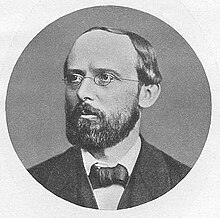Wilhelm von Christ

Wilhelm von Christ (2 August 1831 – 8 February 1906) was a German classical scholar.
Biography[edit]
The son of a baker and a miller's daughter, Christ was born in Geisenheim in Hesse-Nassau. He attended the Gymnasium in Hadamar and studied in Munich from 1850 under Karl Halm, Friedrich Thiersch, Karl von Prantl, and Leonhard Spengel, then in Berlin under Friedrich Adolf Trendelenburg, August Boeckh und Franz Bopp. In 1853 he received his doctorate at Berlin for a work on Aristotle and the next year he became a teacher at the Maximiliansgymnasium in Munich. In 1860, Christ was appointed extraordinary profossor of Classical philology at the University of Munich; he became an ordinary professor in 1863. In 1891/92, he was rector of the university. He maintained a connection to secondary education as a member of the senior school council of Bavaria (1872) and of the Imperial School Commission (1890).
Christ was an extraordinary member of the Bavarian Academy of Sciences and Humanities from 1858 and an ordinary member from 1864. He published numerous articles in the Academy's publications. From 1870, he was an honorary member of the Greek philological society in Constantinople. After receiving the Order of Merit of the Bavarian Crown in 1876, he was raised to the nobility as Ritter von Christ. In 1893, he was named as an ordinary member of the German Archaeological Institute. In 1894, he was admitted to the Bavarian Maximilian Order for Science and Art.[1]
In 1886, Wilhelm Christ was the first to put forward the theory that the Sea Peoples were identical with Plato's Atlanteans.[2] Later, this thesis was repeated with variations by scholars and researchers such as Theodor Gomperz, Spyridon Marinatos, Jürgen Spanuth, John V. Luce, and Herwig Görgemanns.
Selected works[edit]
- Studia in Aristotelis libros metaphysicos collata. Diss. Berlin 1853.
- Grundzüge der griechischen Lautlehre. Teubner, Leipzig 1859.
- Von der Bedeutung der Sanskritstudien für die griechische Philologie. Weiß, München 1860.
- Metrik der Griechen und Römer. Teubner, Leipzig 1874; 2. Auflage 1879. Nachdruck: Gerstenberg, Hildesheim 1972.
- (with Franz Joseph Lauth): Führer durch das K. Antiquarium in München. Franz, München 1870 (several revised editions).
- Geschichte der griechischen Litteratur bis auf die Zeit Justinians. Beck, München 1889; 4. Auflage 1905.
- Reform des Universitätsunterrichtes. Wolf, München 1891 (Rektoratsantrittsrede).
- Editions
- Pindar: Carmina. Teubner, Leipzig 1869. Numerous revised editions.
- (mit Matthaios K. Paranikas): Anthologia Graeca carminum Christianorum. Teubner, Leipzig 1871. Nachdruck Olms, Hildesheim 1963.
- Aristoteles: Ars poetica. Teubner, Leipzig 1878. Numerous revised editions/reprintings.
- Homer: Ilias. Teubner, Leipzig 1884.
- Aristoteles: Metaphysik. Teubner, Leipzig 1886. Numerous revised editions/reprintings.
Further reading[edit]
- Otto Crusius, Gedächtnisrede (“Memorial talk [on Wilhelm von Christ]”; Munich, 1907).
Notes[edit]
- ^ Hans Körner: Der Bayerische Maximiliansorden für Wissenschaft und Kunst. München 2001, p. 88.
- ^ Wilhelm Christ: Platonische Studien: Der Kritias ein historischer Roman, in: Abhandlungen der bayerischen Akademie der Wissenschaften, Vol. XVII, 2nd part, Munich 1886, pp. 451-512.
References[edit]
- . New International Encyclopedia. 1905.
Attribution
- This article incorporates text from a publication now in the public domain: Chisholm, Hugh, ed. (1911). "Christ, Wilhelm von". Encyclopædia Britannica (11th ed.). Cambridge University Press.
